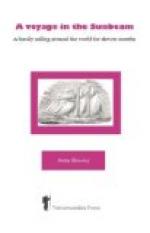The island of Juan Fernandez now belongs to the Chilian government, but is let on a long lease to a man who, they say here, is somewhat of a robber. He was very desirous that we should give him a passage in the yacht, and another man wanted to come too, with some pointers, to show us the best spots for game, goats, turtle, crayfish, and sea-fish, with all of which the place abounds. Some cattle have also been introduced, and the island is much frequented by whalers, who go there for fresh provisions and water. There is nothing particular to be seen, however, and the scenery of the island is not remarkable; at least, so people who have been there tell us, and the photographs I have bought quite confirm their report. Admiral Simpson, who stayed there once for a fortnight, told us a good deal about the place, and strongly recommended us not to go there unless we had plenty of time to spare, as we should not be repaid for our trouble, which would probably only result in the dissipation of all our childish illusions.
Our first step on landing this morning was to go to the Consul’s to post our letters. By the bye, I hope people in England will appreciate them, for they cost between nine and ten pounds to send home. For our outward letters, although prepaid in England, we had to pay over eight pounds before we were allowed to have them from the office. Twenty-nine cases of stores, provisions, wine, &c., which had also been sent out, all arrived safely, and cost comparatively little. There are very good French hair-dressers here, a tempting hat-shop, and a well-stocked book-shop; but everything, as I have said, is frightfully dear.
It was half-past three when the harbour-tug arrived to tow us out of the harbour and so save our getting up steam. There was not a breath of air stirring, but Tom hoped we should find more outside when the tug cast us off. As we dropped slowly out, we had a good view of the harbour and town; and we soon found ourselves once more fairly embarked on the bosom of the wide ocean.




